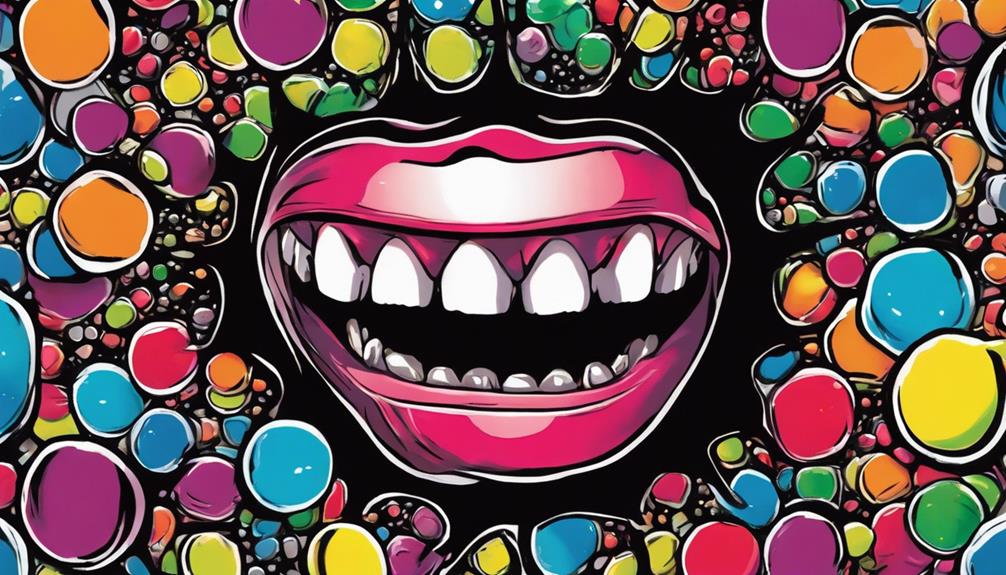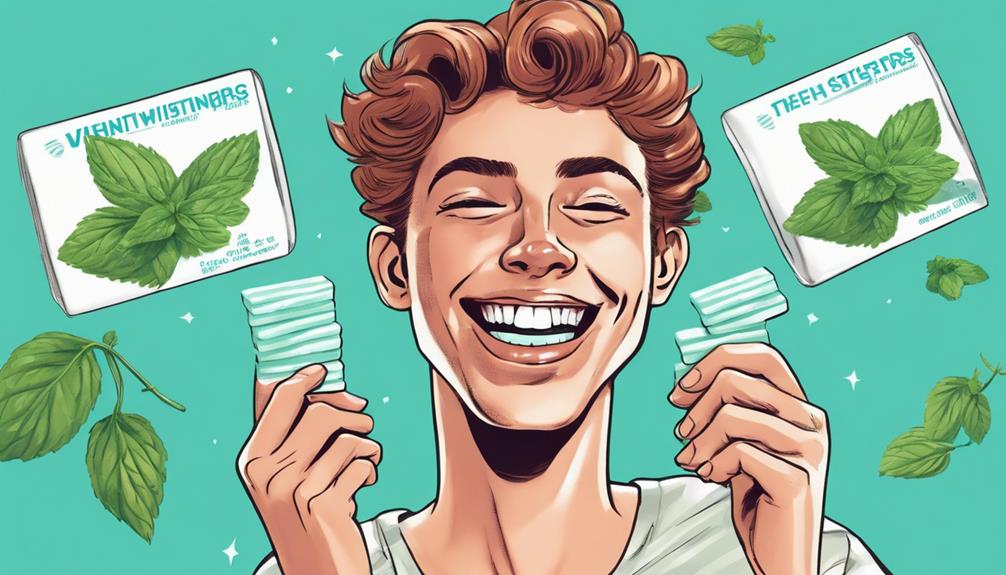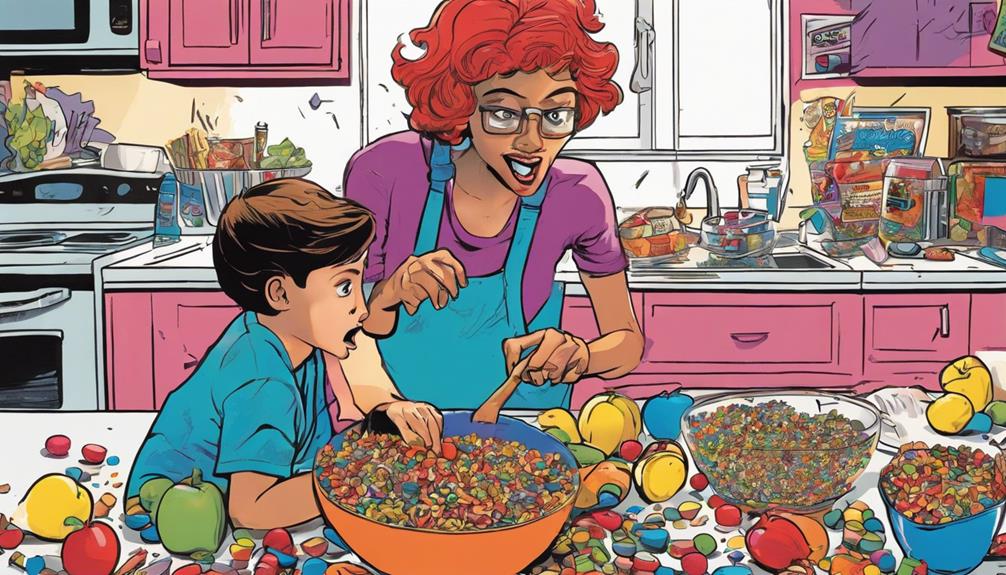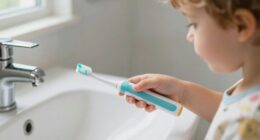Kids need to stop drinking soda because the high sugar and acid levels can harm their teeth. Each sip increases the risk of cavities and enamel erosion, making teeth more susceptible to decay. Soda's sugar feeds harmful bacteria, creating damaging acids that linger on teeth and weaken enamel. Even diet sodas can harm dental health due to their acidic content. Encouraging healthier drinks like water or milk can protect their smiles. By understanding these risks, you'll help your kids make better choices for their dental health and overall well-being. Discover more tips to support their teeth and develop healthy habits.
Key Takeaways
- Soda's high sugar content promotes harmful bacteria that produce acids, increasing the risk of cavities in kids' teeth.
- The acidic nature of soda erodes enamel, weakening tooth structure and leading to long-term dental issues.
- Regular soda consumption can lead to aesthetic changes and potential tooth loss, affecting children's overall health and confidence.
- Drinking soda exposes teeth to harmful acids for extended periods, necessitating proper post-consumption care to mitigate damage.
The Dangers of Soda
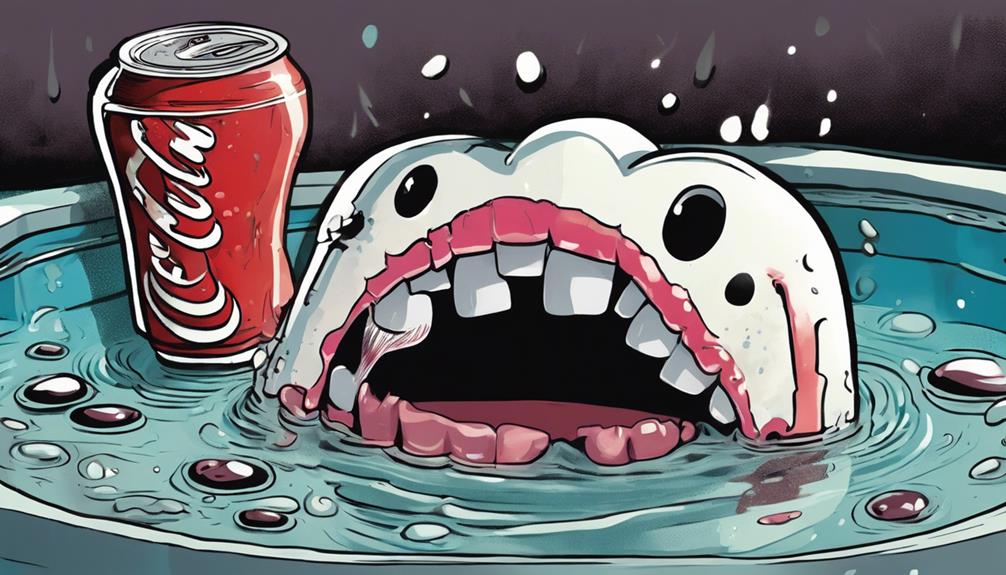
Soda poses serious dangers to your child's dental health, exposing their teeth to harmful levels of sugar and acid that can lead to cavities and enamel erosion.
A standard 12 oz. can of soda contains around 10 teaspoons of sugar, which can contribute greatly to cavity formation in children's developing teeth. The acidic ingredients in soda, such as phosphoric and citric acid, lower the mouth's pH, increasing the risk of erosion. When the pH drops below 5.5, enamel begins to weaken, making teeth more susceptible to decay.
What's alarming is that acid from soda can linger on teeth for up to 20 minutes, continuously attacking enamel and heightening the chances of cavities. Even diet sodas aren't a safe alternative; with a pH around 3.2, they can still weaken enamel, despite lacking sugar.
Children are particularly vulnerable; their teeth are still developing, making them more susceptible to the harmful effects of high sugar and acid content in soda. Protecting your child's dental health means limiting soda consumption, which is essential to preventing cavities and preserving enamel.
Sugar and Acid Effects
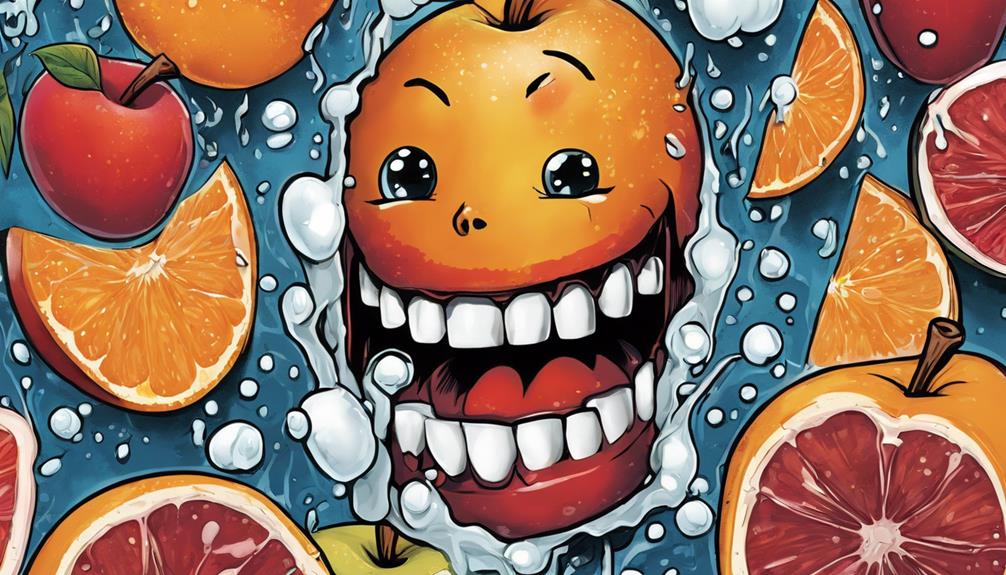
The combination of sugar and acid in soft drinks directly harms your child's teeth by fostering an environment where harmful bacteria can thrive and produce even more damaging acids. When your child drinks soda, the sugar interacts with these bacteria, leading to the formation of acids that erode tooth enamel. This erosion greatly increases the risk of cavities, making it vital to understand the effects of soda on their teeth.
The acid in soda can lower mouth pH to levels that are 1000 times more acidic than safe levels, starting enamel erosion at a pH of 5.5. After consuming soda, the acid can linger on teeth for up to 20 minutes, continuously damaging enamel with every sip.
It's essential to acknowledge that both regular and diet sodas contain harmful acids, like citric and phosphoric acid, which weaken enamel even in sugar-free options.
Long-term exposure to high sugar and acid levels in sodas leads to notable aesthetic changes in tooth appearance and potential tooth loss. Protecting your child's teeth from this damage is fundamental for their long-term dental health.
Alternatives to Soda
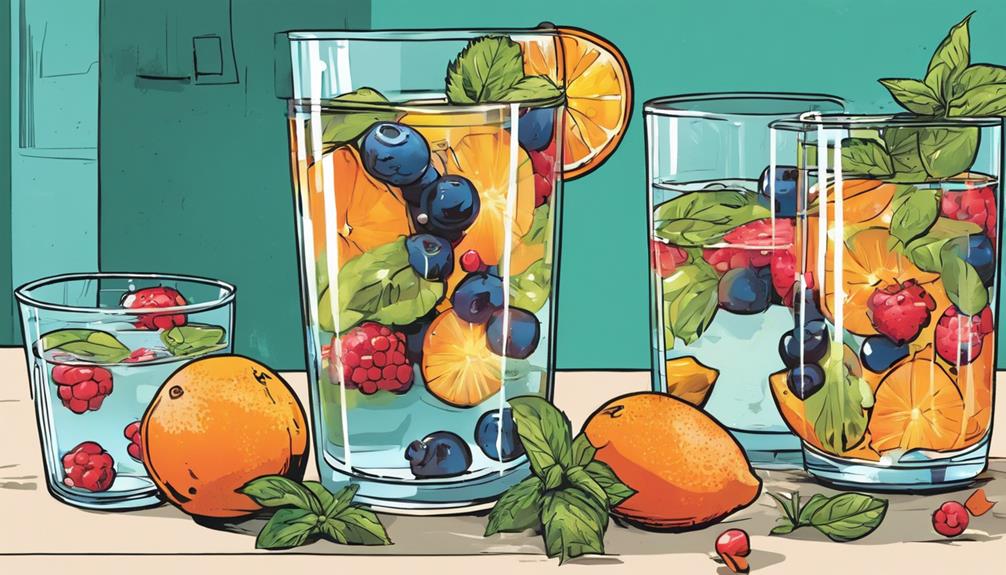
When you're looking for alternatives to soda, there are plenty of healthier beverage choices that can keep you refreshed.
Whole fruits, sparkling water, and herbal teas not only taste great but also support your dental health.
You can even whip up delicious smoothies or infused water to enjoy tasty snacks without the sugar and acidity found in soda.
Healthier Beverage Choices
Choosing healthier beverages can greatly benefit your dental health and overall well-being. Instead of reaching for soda, consider drinking water, which is the best option for hydration. It contains no sugar or acid, protecting your teeth from decay.
If you crave something fizzy, sparkling water without added sugars or acids can be a revitalizing alternative that won't harm your dental health. Whole fruits are another great choice. They provide essential vitamins and minerals while being less acidic than soda, helping to protect your tooth enamel.
If you enjoy fruit juice, limit your intake to six ounces per day and choose 100% juice without added sugars to minimize sugar and acid exposure. Milk is also an excellent option, packed with calcium that strengthens your teeth and bones.
Nutritious Snack Options
Swapping out sugary drinks like soda opens the door to a variety of nutritious snack options that can boost your dental health. Whole fruits, like apples and berries, aren't only delicious but also packed with vitamins and minerals. They provide essential nutrients without the high acidity and sugar content found in soda.
Consider munching on crunchy vegetables, such as carrots and cucumbers. These snacks promote hydration while offering crucial nutrients that support your dental health.
Yogurt, especially unsweetened, is another great option; it's rich in calcium, which strengthens teeth and helps maintain a healthy mouth.
You can also enjoy nut butters paired with whole-grain crackers or apple slices. This combination delivers protein and healthy fats, making for a satisfying and tooth-friendly treat.
Don't forget about water—it's your best bet for hydration. Drinking water helps rinse away food particles and acids, contributing to your overall dental health.
Post-Consumption Care
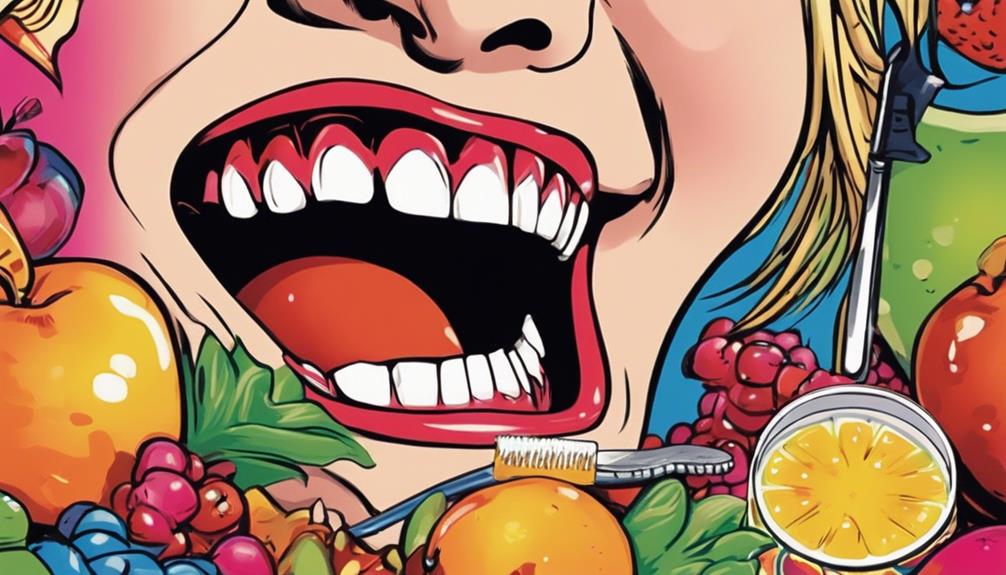
To protect your child's teeth after drinking soda, encourage them to rinse their mouth with water to wash away harmful sugars and acids. This simple act is essential for effective post-consumption care, helping to neutralize the acids that can damage enamel.
Rinsing quickly reduces the acid's interaction time with teeth, minimizing potential erosion.
Here are some tips to enhance your child's post-consumption care:
- Rinse thoroughly: Confirm they swish the water around their mouth for at least 30 seconds.
- Drink quickly: Teach them to finish soda quickly instead of sipping slowly to limit acid exposure.
- Use a straw: This helps reduce direct contact between soda and teeth, providing extra protection for enamel.
- Wait before brushing: Advise waiting 30-60 minutes after consuming soda before brushing to avoid damaging softened enamel.
Preventing Dental Damage
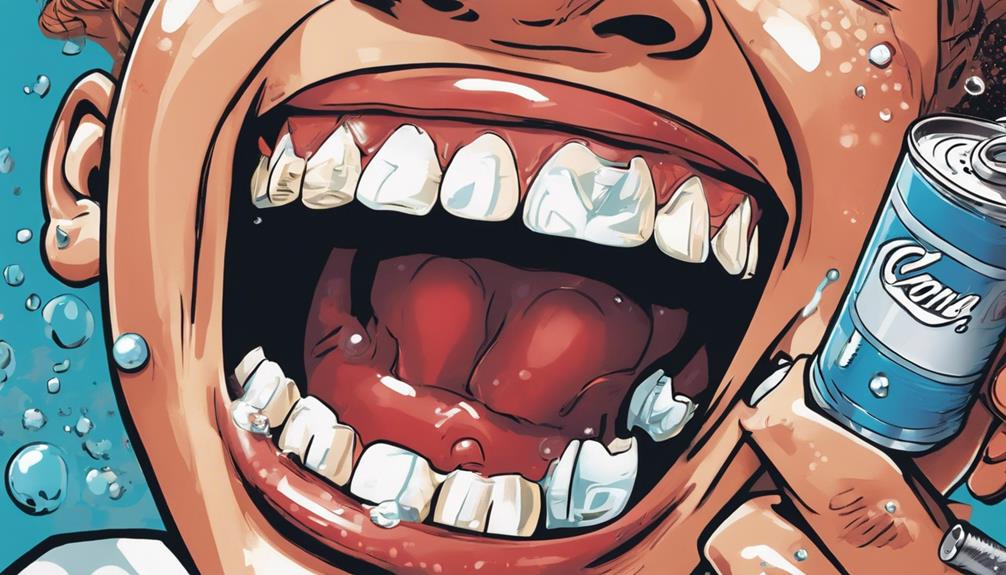
To prevent dental damage from soda, it's essential to understand its effects on your teeth.
You can explore alternative solutions that protect your child's dental health while still allowing for occasional treats.
Education on Soda Effects
Understanding the effects of soda on dental health is essential for making informed choices that protect your child's teeth. Soda is packed with sugar and harmful acids that contribute to cavities and dental erosion. When sugar interacts with oral bacteria, it creates acids that can weaken tooth enamel for up to 20 minutes. This means every sip of soda increases the risk of damage to your child's teeth.
To help you understand the impact of soda on dental health, consider these key points:
- High Sugar Content: A 20-ounce soda can have over 19 teaspoons of sugar, promoting cavity formation.
- Acidic Environment: Both regular and diet sodas contain acids that can lower mouth pH, leading to enamel erosion.
- Sipping vs. Chugging: Drinking soda quickly reduces contact time with teeth, minimizing damage.
- Routine Check-ups: Regular dental visits can catch issues early and reinforce education on soda's effects.
Alternative Solutions Offered
Offering healthier beverage alternatives can greatly reduce the risk of dental damage from soda consumption. You can encourage your kids to explore options like flavored water or herbal teas, which satisfy cravings without the sugar and acidity found in sodas.
Additionally, make it a goal to limit soda intake to no more than 12 ounces per day. This simple adjustment can considerably help mitigate enamel erosion and cavities.
Promoting water consumption is vital, too. Try engaging your kids in fun water challenges, making it exciting to choose healthier choices over sugary drinks.
Regular dental check-ups are important, as they help identify early signs of enamel erosion. By staying on top of dental visits, you can guarantee timely interventions and protective measures like sealants, which can safeguard teeth from further damage.
Long-Term Health Considerations
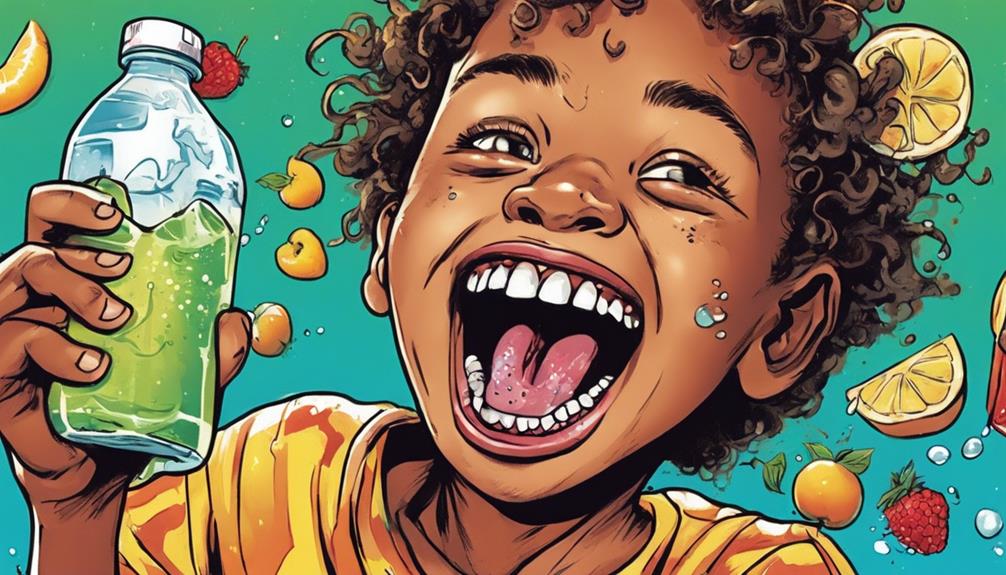
Long-term soda consumption can seriously harm your child's dental health, leading to issues like enamel erosion and cavities. The acidic nature of sodas can lower the mouth's pH, contributing to irreversible damage. With each sugary beverage, the risk of cavities increases greatly. Children who regularly consume soda are more likely to develop dental caries, which can affect their overall health and well-being.
To promote better dental health, consider the following strategies:
- Encourage a diet low in sugary drinks.
- Offer water or milk as healthier alternatives.
- Educate your child about the effects of soda on teeth.
- Schedule regular dental check-ups to monitor any issues.
Frequently Asked Questions
What Does Soda Do to Your Teeth for Kids?
Soda's high sugar and acids can weaken your teeth. They create an acidic environment that harms enamel, leading to cavities. Even just a sip can start damage, making your teeth more vulnerable over time.
Why Do Dentists Warn Against Soda?
You might think soda's just a rejuvenating treat, but dentists warn it's a hidden danger. With high sugar and acid levels, it attacks your enamel, leading to cavities and long-term dental damage.
Will My Teeth Get Better if I Stop Drinking Soda?
Yes, your teeth can improve if you stop drinking soda. Eliminating sugary and acidic drinks helps stabilize your mouth's pH, reducing the risk of cavities and enamel erosion, leading to better overall dental health.
What Happens to Kids When They Drink Soda?
When you let kids indulge in soda, their smiles might face a tough battle. Sugary sips can lead to pesky cavities and enamel woes, affecting their dental health and overall confidence as they grow.
How Does Stress Impact Kids’ Consumption of Soda and Their Dental Health?
Recent studies have shown a clear link between stress and dental health in children. Higher stress levels have been found to be associated with increased consumption of soda, which can have negative effects on dental health. It’s important for parents to be aware of this connection and take steps to reduce stress and promote healthy dental habits.
Conclusion
To sum it up, kids really need to cut back on soda for their dental health.
Did you know that nearly 60% of children have experienced cavities by age 5? That's a staggering number that highlights the importance of making healthier choices.
By swapping soda for water or milk, you can help protect their teeth and set them up for a healthier future.
Remember, every small change counts towards preventing dental damage and promoting overall well-being!
